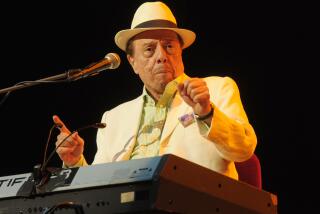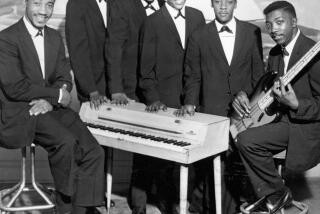Harold Battiste dies at 83; influential New Orleans musician
Harold Battiste, the New Orleans-born composer, producer, arranger and musician who put his distinctive stamp on the city’s music for several decades, died Friday after a lengthy illness, his son Harlis said. He was 83.
Battiste founded the first African American musician-owned record label, All For One, better known as AFO Records, in 1961. The label became home briefly to many of New Orleans’ top players and singers, including Lee Dorsey, Tami Lynn and Barbara George.
In his 2010 autobiography “Unfinished Blues,” Battiste wrote that he was inspired by the speeches of Nation of Islam leader Elijah Muhammad, who “often spoke to the need for our people to create wealth through ownership.”
“It seemed that every ethnic group was identified with a product or service that they owned and controlled,” Battiste wrote, “and it seemed that the product generally attributed to us was music: jazz, blues, R&B, gospel.”
The label’s biggest hit was George’s vibrant, gospel-inspired “I Know (You Don’t Love Me No More),” which reached No. 1 on the R&B charts and No. 3 on the pop charts.
Battiste also lent his talents to numerous studio sessions in Los Angeles in the 1950s and ‘60s. He played that distinctive soprano sax melody on Sonny and Cher’s “I Got You Babe” and later served as music director on their television variety show.
“Sonny wouldn’t do anything without me,” Battiste told the Advocate newspaper in a 2010 interview. “Sonny knew what I could do better than I knew. He told me, ‘Man, you’re better than most of these cats out here!’ But I didn’t know that anything that I did had that much value. I got $125 for ‘I Got You Babe.’ That’s all.”
Battiste also arranged Sam Cooke’s first secular hit, “You Send Me,” and played piano on his civil rights anthem “A Change Is Gonna Come.”
Battiste was instrumental in developing New Orleans music icon Mac Rebennack’s famous Dr. John persona, producing his first album, 1968’s “Gris Gris,” a spooky, psychedelic-tinged stew of voodoo New Orleans R&B recorded in L.A.
Battiste and Dr. John reportedly cut the record quickly, using leftover studio time from a Sonny and Cher session.
“The key to when I did the Dr. John thing,” Battiste told the Advocate, “I just had to get a bunch of New Orleans people. I knew that we would make the vibe that we wanted.”
Battiste was born Oct. 28, 1931, in New Orleans, the son of Pearl Wilmer Bodar and Harold Battiste Sr. He grew up near the famed Lasalle Street R&B nightclub the Dew Drop Inn and recalled in his memoir how its proximity influenced his path in life.
“I could hear the music coming from there on my front porch and in my living room,” he wrote. “It was the music of the black stars of the day: lots of R&B, a little swing, a little jazz, a bit of jump. It was all about the rhythm, and I couldn’t help but be drawn to that music because it spoke directly to my spirit.”
Battiste earned a bachelor’s degree in music education from Dillard University in 1952. After graduating, he taught music at the Beauregard Parish Training School in DeRidder, La., before pursuing a record deal in California. For the next 30 years, he split his time between New Orleans and Los Angeles, where he taught jazz at the Colburn School of Music.
Battiste returned to New Orleans in 1989, joining Ellis Marsalis Jr. as a professor of jazz studies at the University of New Orleans.
“Harold was always a guiding force,” Marsalis said in a 2009 interview with Loyola University New Orleans’ Center For Music and Arts Entrepreneurship. “He was always championing jazz music.”
Battiste suffered a stroke in 1993 that limited his ability to play. In recent years, he focused his attention on composing, cataloging and promoting the heritage of New Orleans music and reviving the AFO label, transforming it into a nonprofit foundation.
Battiste’s 35-year marriage with Alviette Dominque ended in a 1988 divorce.
A 1995 union with New Orleans schoolteacher Berweda Hatch ended when they separated two years later.
Battiste’s survivors include children Harold III, Andrea, Marzique and Harlis; a grandchild; and a great-grandchild.
Twitter: @GlennWhipp
More to Read
Start your day right
Sign up for Essential California for the L.A. Times biggest news, features and recommendations in your inbox six days a week.
You may occasionally receive promotional content from the Los Angeles Times.







